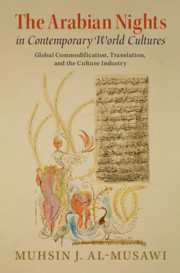For an excellent paper in a history course--be it a short essay or a long research paper--you need to find relevant scholarship to build off of. That material might include peer reviewed:
You can find that material through your beloved Boston College Libraries or we can order necessary material for you through Interlibrary Loan.
You can also find books and articles about Arabian Nights. You can find two examples below. Take a look at the call numbers (O'Neill Stacks PJ7737) and consider browsing the stacks.
 The Arabian Nights in Contemporary World Cultures
by
The Arabian Nights in Contemporary World Cultures
by
Your local libraries have excellent monographs and anthologies located in O'Neill library as well as through the BC libraries portal. Try search for books through the WorldCat library system (search only books) to see if we have it or you need to order through ILL.
Need to check whether a journal article is peer reviewed? Check out Ulrichsweb Global Serials Directory. Look up your journal's name and if Ulrichsweb includes a  symbol, you know it's been peer reviewed (also called "refereed").
symbol, you know it's been peer reviewed (also called "refereed").